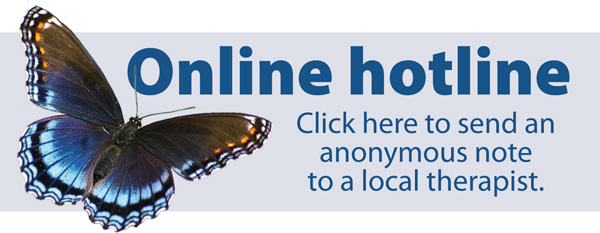Welcome to new nwaMotherlode.com sponsor, Methodist Family Health! The licensed counselors at Methodist Family Health will be fielding questions from local women in our monthly “On Your Mind” feature. This feature tackles the mental and emotional issues that can affect any of us, including things like grief, anger, depression, stress, anxiety and more.
Remember that you can submit a completely ANONYMOUS question to one of the counselors at Methodist Family Health. Just submit the question via our online hotline link by clicking the butterfly icon below this post. The question will be received with absolutely no email address or other identifying information attached to it. Once your question is received, a counselor will answer it here on nwaMotherlode.com in an upcoming “On Your Mind” post.
Here’s this month’s question.
Q: Sometimes I just don’t know how to deal with my teen-aged daughter. She is moody so often and seems angry at the world. How do I know when it’s time to seek help or speak to a mental health counselor?
A: I feel your pain. The mood swings that sometimes accompany the teen years can be hard on parents, too.
First, answer these questions:
- Are the problems with your child getting in her way?
- Do they interfere with the major areas of her life, such as going to school, finishing schoolwork, family relationships, peer relationships?
- Has there been legal involvement?
All of these are ways of looking at the impact your child’s symptoms are having on her and the family. Gauge your child’s behavior by that of other kids close to her age. Have there been sudden changes in behavior, especially withdrawing, a loss of interest in things she used to like (such as suddenly dropping out of an extracurricular activity), crying spells, or sleep disturbance, such as difficulty falling asleep or waking in the middle of the night?
In some children, stomach aches, headaches and other physical complains can be linked with feeling anxious or depressed. Any mention of harming herself or others or threats of suicide should be red flags. Whatever you do, do NOT ignore these signs.
So here’s what you can do. First, contact your school counselor, family doctor or an outpatient provider to determine if you need additional services. Many providers have therapists who can meet privately with children in their school setting so their school day is less disrupted. It’s so important that you keep talking to your teen, while at the same time respecting her need for privacy. Be direct and honest and tell her what specific changes you’ve noticed in her and why you’re concerned.
Mental health professionals are equipped to offer sound advice to parents and children alike and to work with your family to create an effective treatment plan. Don’t be afraid to seek the help and advice of a licensed mental health professional.
Wishing you and your daughter the very best.
Methodist Family Health is a nonprofit organization that provides behavioral and mental health services to children under 18 and their families in Arkansas. Methodist Family Health has all levels of care, ranging from outpatient counseling clinics to residential treatment centers to an inpatient behavioral hospital and an extensive staff of trained therapists and mental health professionals. To find out more about Methodist Family Health, call 501.661.0720 or 866.813.3388 toll free, or visit www.methodistfamily.org.
Click the butterfly icon below to fill out an anonymous submission form with your question or concern. The form contains NO identifying information and is designed to give local women an online place to share concerns with a person qualified to offer feedback.
Disclaimer: This RESPONSE does not provide medical advice It is intended for informational purposes only. It is not a substitute for professional medical advice, diagnosis or treatment. Never ignore professional medical advice in seeking treatment because of something you have read on nwaMotherlode or the Methodist Family Health website.


